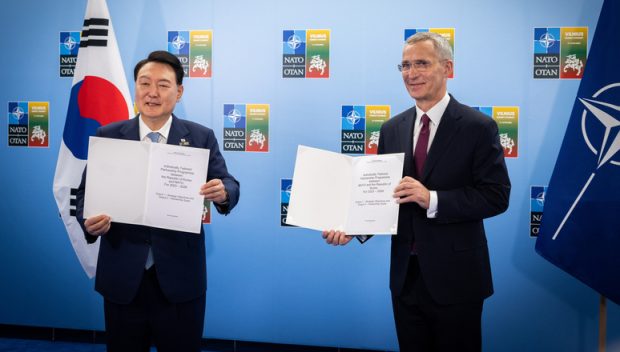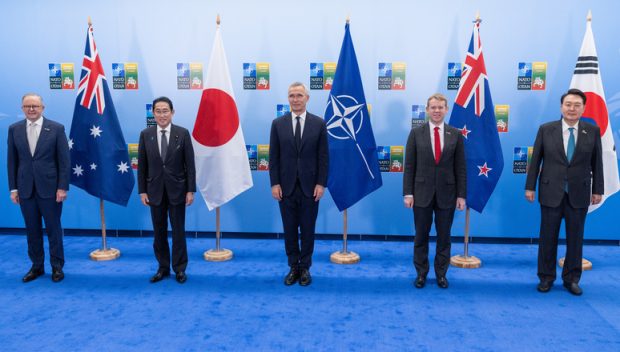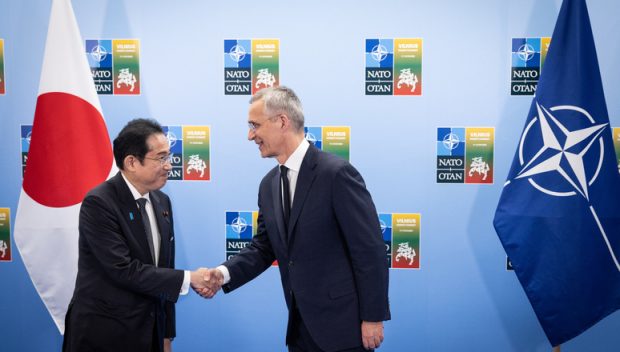
NATO deepens partnership with Korea, Japan; stresses strategic significance of Middle East

NATO Secretary General Jens Stoltenberg meets with Republic of Korea president Suk Yeol Yoon
By Habib Toumi
VILNIUS: The North Atlantic Treaty Organization (NATO) has expanded its engagement with South Korea and Japan – two key Asian countries- by expanding cooperation in areas of global concern and stressed that the Middle East is a region of strategic interest.
In its 2023 Summit Communiqué issued in Vilnius, Lithuania, NATO pledged to deepen its political engagements and public diplomacy outreach to its long-standing partners in the Mediterranean Dialogue and Istanbul Cooperation Initiative (ICI).
The ICI, an initiative launched by MATO in the Turkish city in 2004, seeks to offer countries of the Gulf practical bilateral security cooperation with the alliance that will contribute to long-term global and regional security. Kuwait joined in December 2004, Bahrain and Qatar in February 2005 and the UAE in June 2005.
NATO said it was implementing the Defense Capacity Building packages for Iraq, Jordan, Mauritania, and Tunisia and would explore with the Jordanian authorities the possibility of establishing a NATO Liaison Office in Amman, while remaining committed to supporting Iraq and its ability to stabilize the country.
“Based on the request from the Iraqi government, we are considering broadening NATO Mission Iraq, by evolving it to provide advice to the Iraqi Ministry of Interior on its Federal Police,” the communique said.
“NATO Mission Iraq will continue to be demand-driven, and will be carried out with the full consent of the Iraqi authorities, in full respect of Iraq’s sovereignty and territorial integrity, and in close coordination with relevant partners and international actors.”
The 31-member military alliance said that the Indo-Pacific is important for NATO, “given that developments in that region can directly affect Euro-Atlantic security.”
“We welcome the contribution of our partners in the Asia-Pacific region – Australia, Japan, New Zealand, and the Republic of Korea – to security in the Euro-Atlantic, including their commitment to supporting Ukraine,” the NATO heads of state and Government participating in the meeting in Vilnius said.
“We will further strengthen our dialogue and cooperation to tackle our shared security challenges, including on cyber defense, technology and hybrid, underpinned by our shared commitment to upholding international law and the rules-based international order.”

On July 11, South Korean President Yoon Suk Yeol and NATO Secretary General Jens Stoltenberg established a new bilateral partnership for cooperation in 11 areas, ranging from cyber defense, antiterrorism and arms control to emerging technologies and cyber defense, Korean news agency YONHAP reported.
The adopted Individually Tailored Partnership Program (ITPP) elevates the bilateral relationship from the Individual Partnership Cooperation Program (IPCP) established in 2012.
The IPCP outlined cooperation in seven areas, including political-military connectivity, cyber defense, nonproliferation and antiterrorism, while the new ITPP increases the number of areas to include dialogue and consultations to promote mutual understanding on common security threats.
“At a time when security in the Atlantic and security in the Indo-Pacific region cannot be separated, it is more important than ever to have close cooperation between Indo-Pacific nations, such as the Republic of Korea, Japan, Australia and New Zealand, and NATO,” Yoon said, referring to the four countries invited to the summit as NATO partner nations.
Stoltenberg said that South Korea is a highly valued partner of NATO.
“We value the partnership with you because security is not regional, security is global,” he was quoted as saying.
“What happens in the Indo-Pacific matters for Europe and what happens in Europe matters for the Indo-Pacific.”

A new era in bilateral relations between NATO and Japan was also ushered in with the completion of an ITPP deal that will see Tokyo boost cooperation with the alliance in new areas that go beyond traditional security to include cyber, emerging and disruptive technologies and strategic communications.
Japan’s Prime Minister Fumio Kishida said that “the new deal comes not only in response to an increasingly severe international security environment but also in recognition that the security of Europe and the Indo-Pacific are ‘inseparable’.”


